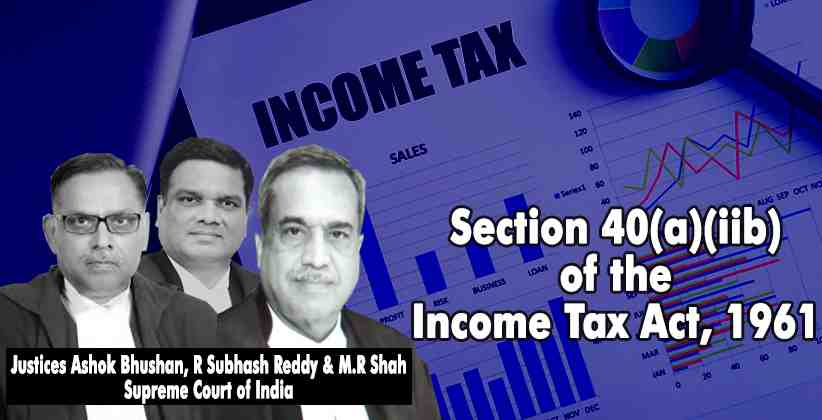On Wednesday (November 25, 2020), the Supreme Court ordered the Madras High Court to rule on the constitutional validity of Section 40(a)(iib) of the Income Tax Act, 1961, which forbids the deduction of royalties, licence fees, etc. in the case of State government undertakings headed by profits and business gains.
The judgement was issued in an appeal lodged by Tamil Nadu State Marketing Corporation Limited (TASMAC) by the Division Bench of Justices Ashok Bhushan, R Subhash Reddy, and MR Shah against a judgement of the Madras High Court that had refused to determine the challenge.
When the vires of Section 40(a)(iib) of the Income Tax Act were challenged, which can be decided by the High Court alone in exercise of powers under Article 226 of the Constitution of India, the High Court ought to have decided the issue on merits. The impugned judgment passed by the High Court is, hereby, quashed and the matter is remitted to the High Court to decide the petition on merits with respect to challenge to the vires of Section 40(a)(iib), the apex court ruled.
Without deciding on the validity of Section 40(a)(iib), the High Court dismissed the said written petition, noting that the vires of the law need not be entertained because the matter was still sub-judicated before the Income Tax Authority.
In the case of the petitioner, the amount deductible in the estimation of the taxes paid under the Income Tax Act was not authorised pursuant to the above clause.
The petitioner argued that the provision was discriminatory and violated Article 14 of the Constitution, because many undertakings of the central government were not subject to any such income tax assessment and enjoyed an exemption.
For the Assessment Year 2017-18, the show cause notice provided by the assessing officer stated that the VAT cost imposed on the appellant was an exclusive levy by the State Government and hence firmly protected by Section 40(a) (iib).
Accordingly, VAT expenditure in the estimation of the appellant's income should not be permitted as a deduction in compliance with Section 40(a)(iib).
The IT Department's evaluation order was challenged before the High Court, which permitted the appeal on the basis of infringement of natural justice. It then sent the matter for fresh determination back to the evaluating officer.
The matter was pending before the assessing officer when the appellant brought another petition before the High Court of Madras, challenging the infringement of Section 40(a)(iib) of the Constitution on grounds of infringement of Articles 14 (right to equality), 19 (right to profession) and 265 (no taxes to be imposed except by the authority of law).
The High Court refused to rule on the appeal citing the pendency of the matter before the Income Tax Authority stating that it is open to the aggrieved party to challenge at the required moment the vires of the provision.
However the Supreme Court disagreed that until the assessing officer issued a notice of cause to TASMAC, the "appropriate moment" may be said to have occurred.
We are of the firm opinion that the impugned judgment and order passed by the High Court is not sustainable at all. The High Court ought to have decided the issue with regard to vires of Section 40(a)(iib) on merits, irrespective of the fact whether the matter was sub -judice before the Income Tax Authority, the Supreme Court said.
Vires of a relevant provision, the apex court observed, goes to the root of the matter.
Once the show cause notice was issued by the assessing officer calling upon the appellant to show cause why the VAT expenditure is not allowable as deduction in accordance with Section 40(a)(iib), it can be said that the cause of action has arisen for the appellant to challenge the vires. The stage at which the appellant approached the High Court and challenged the vires of Section 40(a)(iib) of the Income Tax Act, 1961 can be said to be an appropriate moment, the Supreme Court said.
Accordingly, it admitted the plea, set aside the judgement of the High Court and referred the matter back to the High Court for a determination of the validity of Section 40(a) (iib) of the Income Tax Act, 1961.






